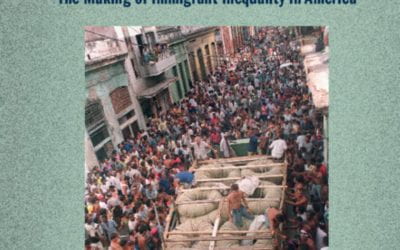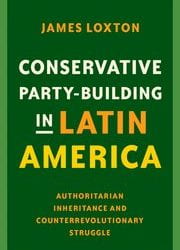Chocolate Forteza: Developing the Cacao and Chocolate Industry in Puerto Rico
Since a very early age, I worked in the summers in chocolate factories, in the markets where chocolate was sold and in the fields where the raw materials grew. I developed a passion for chocolate and the production process. I come from a family that has been producing chocolate in the Caribbean through the family business Cortés Hermanos, processing cacao and chocolate since 1929 in Puerto Rico and the Dominican Republic.
As a result of those experiences, I felt a profound desire to get involved in agriculture and a great nostalgia on realizing that the Puerto Rico where I was raised now lacked the agriculture that my grandparents and parents grew up with. With the identity of being the fourth generation of my family to manufacture chocolate, combined with my desire to get involved in agriculture, I began to explore my God-given tools to become involved personally and professionally through Forteza Caribbean Chocolate.
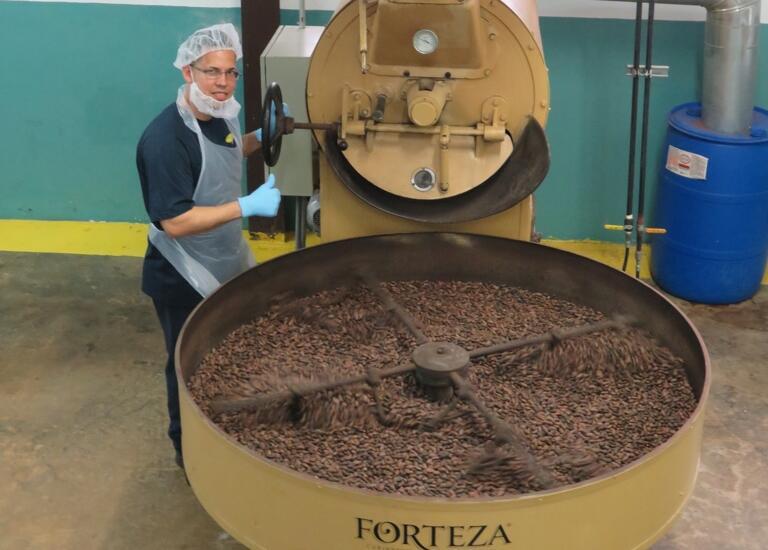
Since its beginning in 2014, Forteza has always had the goal of developing the cacao and chocolate industry in Puerto Rico. In my case, as the brand’s founder, I was determined to support economical and ecological sustainability. For example, we try always to buy from local suppliers and to avoid the use of plastic when possible.
To say that it has been a difficult path would be an understatement, considering that the island has a social and economic history that would make an agro-business person in the 21st century opt for just about any other route. Moreover, since 2017, we have faced hurricanes and earthquakes that have infringed on and continue to infringe on the hope and enthusiasm of Puerto Ricans to persevere with ideas and projects. It could take up the entire 2,000 words that I have been given to write this article to comment on the challenges, but to talk about more inspiring themes like chocolate and God’s will, I will sum up these challenges as…an economic policy that practically excludes agricultural development, the lack of an agricutural ecosystem that streamlines and makes easy the development of new proposals for local food products, a culture of sales and consumption that is highy focused on support in favor of imported products rather than local goods, not to mention two Category 5 hurricanes in 2017, the worst earthquake in a century in 2020 and the new world pandemic of Covid-19.
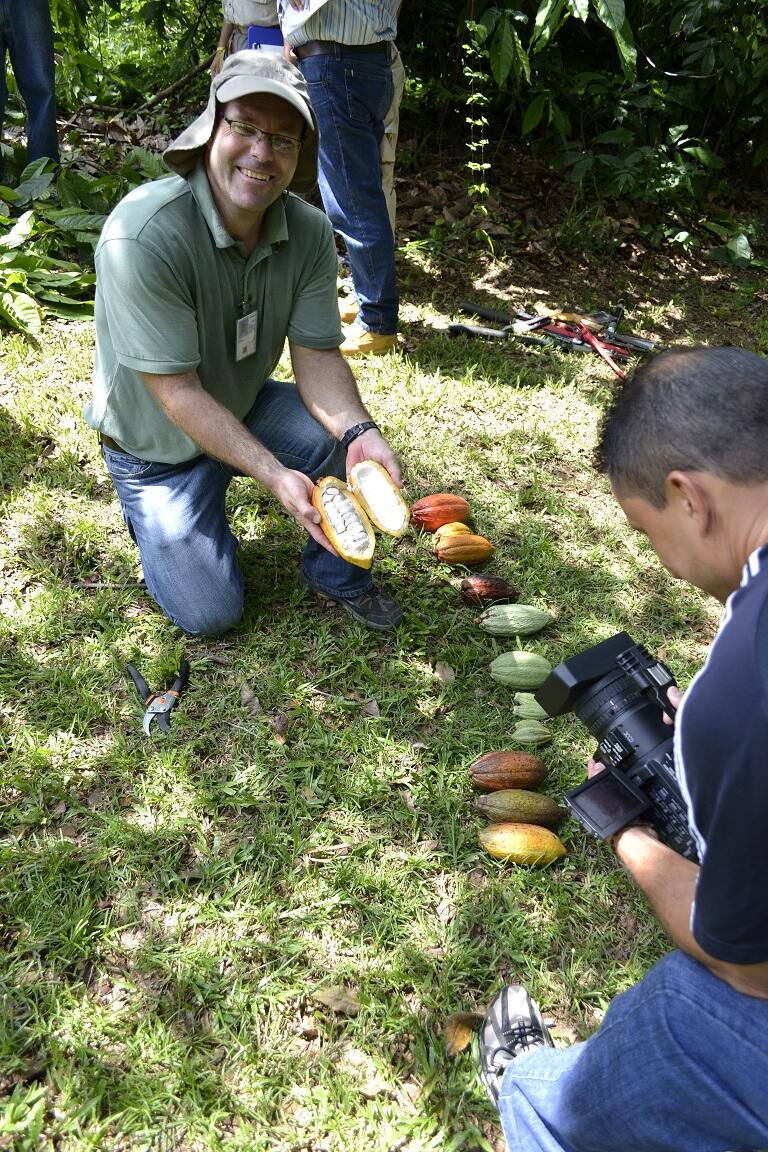
The social and economic challenges related to the small quantity of agriculture on the island, plus the additional challenge of convincing consumers to pay three and four times the price they are used to paying for chocolate means we needed to focus on quality and the development of good relations with the actors in the value chain. The challenges related to the events of hurricanes, earthquakes and the pandemic, since they were totally unplanned, have been and are handled as they come, based on years of accumulated knowledge.
With respect to agriculture, the most important aspect has been the continued and direct development of our relationship with the farmers. Using our experience with Cortés Hermanos and the cacao industry in the Dominican Republic and the generation of two proposals of the USDA Specialty Crops Grant, we are ensuring that participants’ farms have the necessary conditions to continue their cacao harvests, and we have managed to subsidize half the costs of a total of 22,000 trees grafted for the farmers. In Forteza, we decided to assume the responsibility of supporting the farmers directly, looking for new strategies with them and with government agriculture entities in Puerto Rico, the Dominican Republic and the United States. Today we feel thankful and blessed that we can say that in Puerto Rico farmers have easily accessible knowledge on how to plant cacao; genetic material for high quality and available crops; a network of several farmers who are learning, planting, producing cacao and even sometimes marketing their own chocolate thanks in part to this affinity we have managed to develop along the industry’s supply chain.
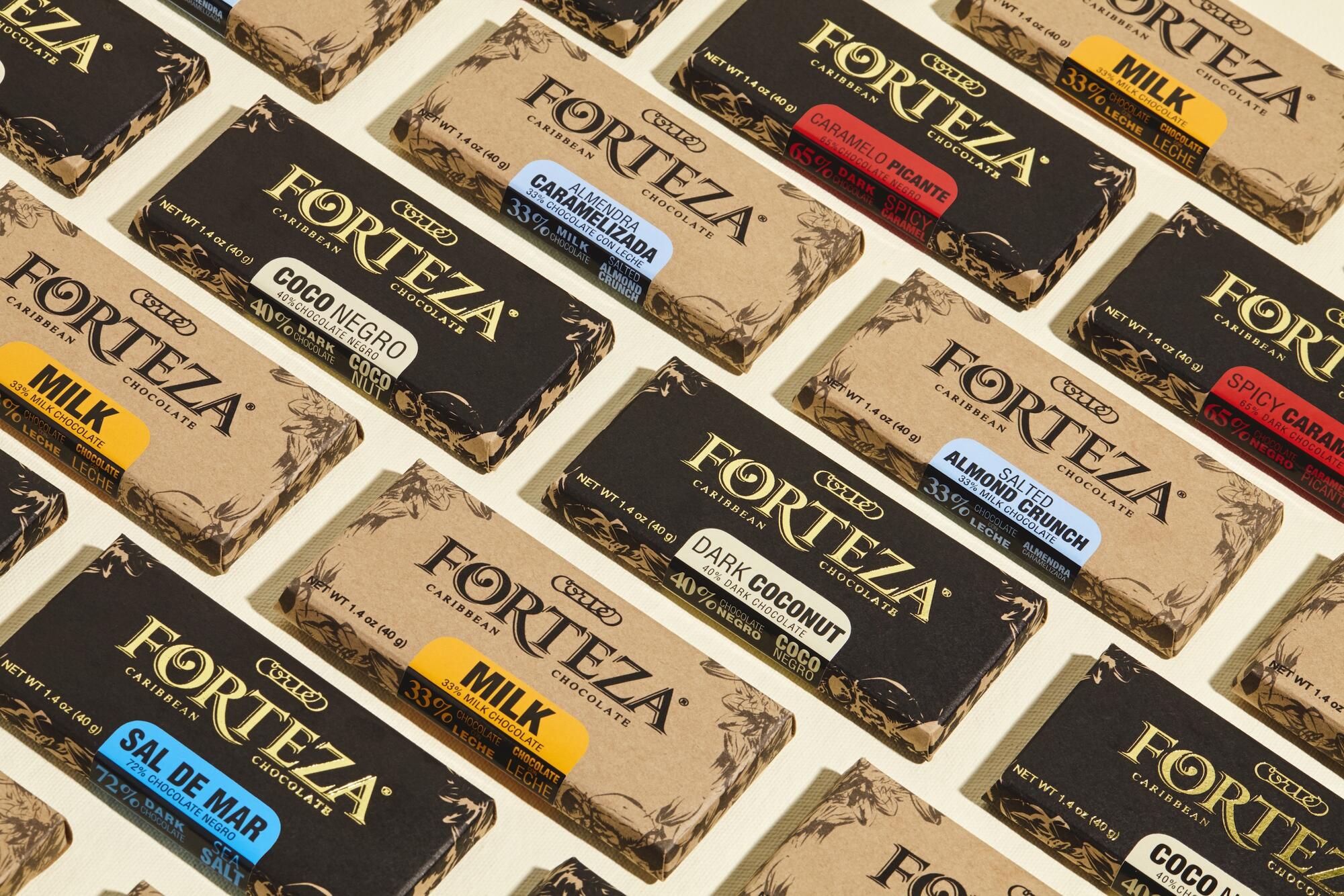
Hurricanes Irma and María in September 2017 in Puerto Rico represented a watershed moment for the project. That year many cacao farmers began to see the first productions of their harvests and we had projected the second line of innovative flavors of Chocolates Forteza for the end of the year with which we expected to double our sales and the demand for local chocolate and cacao. Clearly the destruction caused by the Category 5 hurricanes held back our plans, but thanks to a genuine interest in supporting our employees and suppliers, perseverance in the face of adversity and above all the favor of God, our plans were not done away with.
At first, we took advantage of the weeks we had been held back because of lack of electric energy to carry out general maintenance on the factory and an assessment of the impact on the farms to begin to develop initiatives for recuperation. The plan to introduce a new line of Forteza products was maintained and carried out before the end of the year and we felt satisfied to have fulfilled the responsibility of being examples of perseverance and hope. Finally, in spite of the climactic challenges, in 2018 we achieved various goals to double our sales with the new launch, to increase the income from Puerto Rican cacao and the approval of a proposal to distribute 12,000 trees for the recuperation of the affected farms.
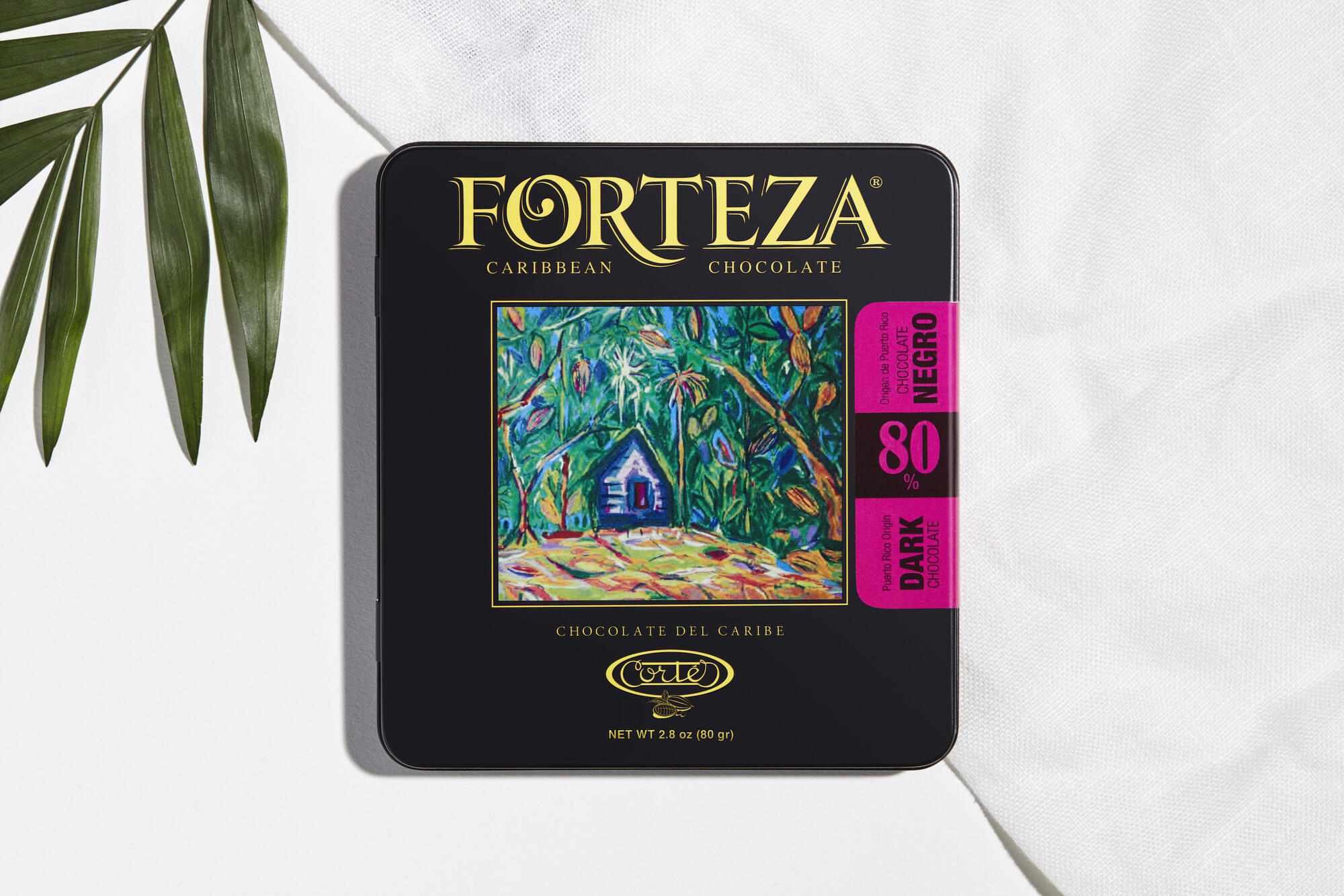
To successfully achieve the goals of the brand, the products of cacao and chocolate should meet an optimum standard. To combat the high costs of agriculture and manufacturing on the island, we were faced and continue to face the need to search for innovative mechanisms to increase the attributable value of the product and the brand. To overcome the social and economic factors and prosper with the project required developing good relations with the entire value chain in the process from the farmers, employees, government agencies, packaging suppliers, consumers and communications media. The quality and good relationships with our associates was and continues to be the way in which we distinguish ourselves in the market and to be profitable.
To work with quality requires paying great attention to the elements of sustainability, ethics and social commitments, aspects that God has made me recognize that in circumstances of less adversity, I would have not been able to see, attend or get involved. In a society like ours today, we generally attribute quality to elements that are physically perceptible to us immediately. We tend to measure the quality of products that appeal to us through the senses and economically, their marketing, who uses them, and other factors that their producers can resolve with budgets that determine the capacity to add or subtract this instant value from the product.
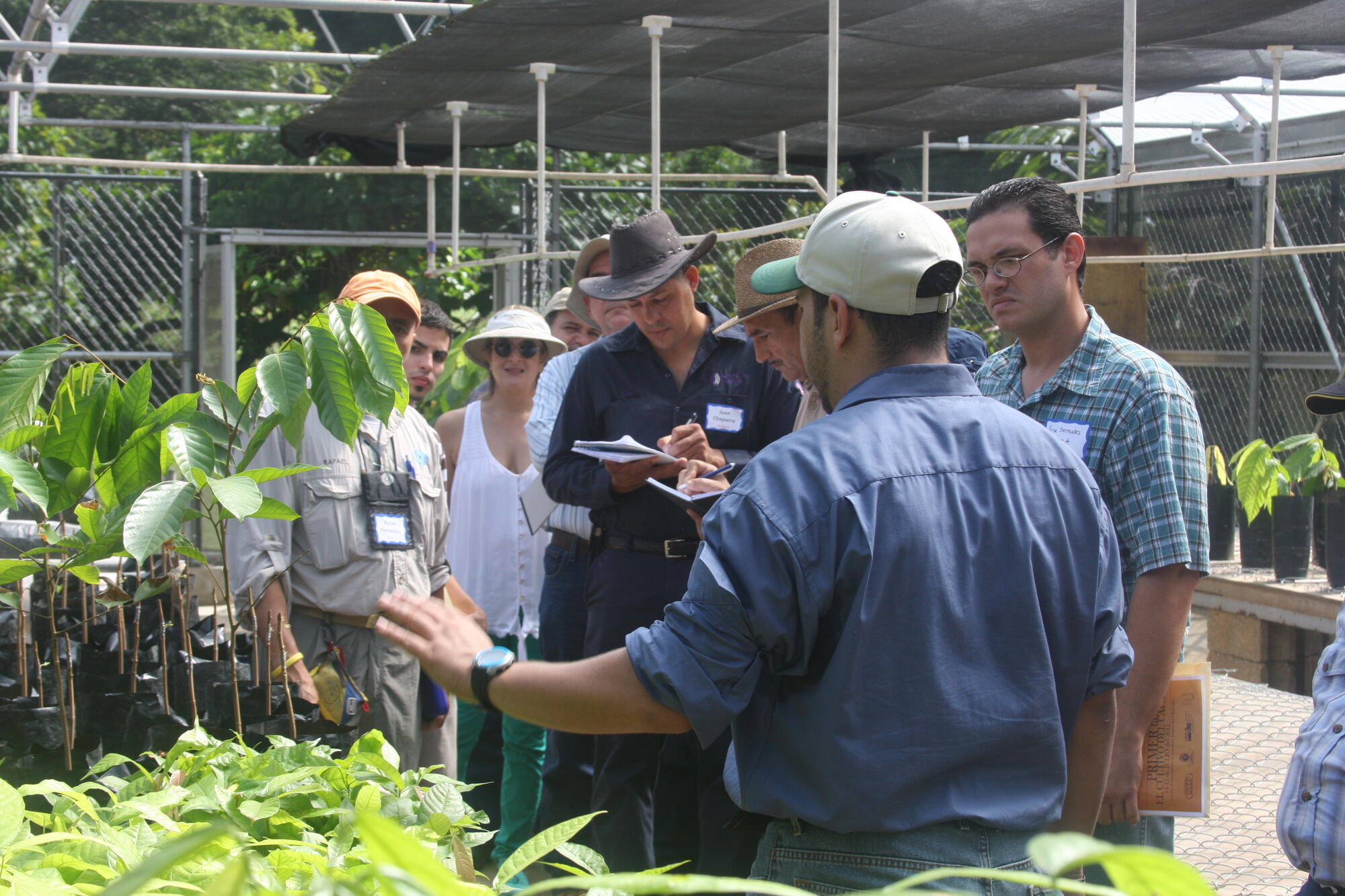
Now then, sustainability frequently is not considered in what we consider to be quality because its impact is only reflected over time and distributed throughout the value chain. Its involvement is not physically perceptible in an individual manner, although we are generally disposed to recognize its value, but we do not consider it as part of the quality of the product. From its inception, in Chocolate Forteza, we have made an effort to attend to and balance these two aspects of quality, and thanks to persistence in this work, we have managed with our associates to develop this complementary relationship so necessary to face initial challenges and to define a product that is sustainable over time.
I have had within my reach a good knowledge of the process of chocolate making through my direct work with processing, a network of resources and technical support with much experience, cacao and chocolate processing equipment available with relatively little investment, parents who have supported me in my projects, financial means to make the necessary investments and many other blessings. In spite of all these favorable elements, it’s important to emphasize that from the beginning, the project was undertaken considering the most effective and efficient use of all the resources to develop the brand and promote the cultivation of cacao in Puerto Rico. This element of effective administration was and continues to be key for the project’s success and the development of a culture of efficiency.
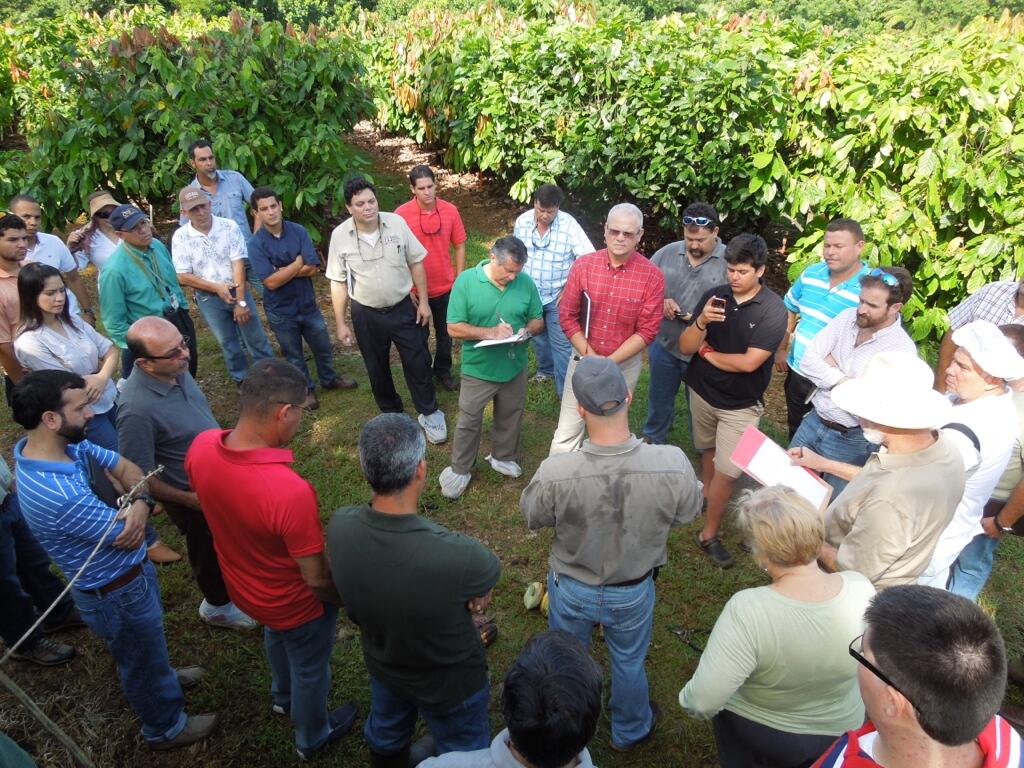
After 2017, in Puerto Rico, we can say we live “waiting for the blow” of the next hurricane season. The memories of the destruction of Hurricane María have left a psychological impact on those of us who lived through it. In this year 2020, we once again experienced the great power of nature when in January over the course of weeks, several destructive earthquakes shook the island, including the most powerful one in about a hundred years. Combined with the pandemic of Covid-19, this year has been another one of great challenges. The impact of these unforeseen events has caused a considerable decline in our sales. However, with much faith, we have maintained our operation with optimism and confidence that the roots that have been sown for the brand are sufficiently deep to be able to persevere. Although the final impact of what we have lived through in 2020 is yet to be seen, we are actively looking for alternatives that will allow us to find and capitalize on the opportunities that these challenges represent. With the determination to keep progressing, the desire to increase the demand for Puerto Rican cacao, and taking advantage in the drop of sales for 2020, we are planning to implement the exclusive use of local cacao for the production of Forteza on the island. Clearly the God-given circumstances have opened the door to keep on fulfilling our project’s goals. We can only trust.
Chocolate Forteza: El Desarrollo de la Industria de Cacao y Chocolate en Puerto Rico
Por Eduardo Cortés
Desde muy joven, trabajé los veranos en las fábricas que producen chocolate, los mercados en donde se comercializan y los campos que producen su materia prima.
Desarrollé una pasión por el chocolate y por el proceso de producirlo. Yo vengo de una familia que produce chocolate en el Caribe a través de la empresa Cortés Hermanos, la cual desde el 1929 procesa cacao y chocolate en Puerto Rico y República Dominicana.

Siempre sentí un deseo profundo de involucrarme con la agricultura y una gran nostalgia al ver que el Puerto Rico en el cual crecía, carecía de la agricultura con la cual mis abuelos y padres se criaron. Con la identidad de ser integrante de la cuarta generación de una familia que manufactura chocolate y el interés de involucrarme con la agricultura en Puerto Rico procedí a explorar las herramientas que Dios puso a mi alrededor para desenvolverme personal y profesionalmente a través de Forteza Caribbean Chocolate.
Desde su inicio en el 2014, Forteza siempre tuvo una meta, desarrollar la industria de cacao y chocolate en Puerto Rico. Como fundador de la marca, me sentí comprometido a apoyar la sostenibilidad económica y ecológica de Puerto Rico.

Decir que ha sido un camino difícil sería justo considerando que la isla tiene una historia económica y social que pone a cualquier agro empresario de Puerto Rico en el siglo 21 a hacer cualquier otra cosa. Más aún cuando desde el 2017 hemos enfrentado huracanes y terremotos que atentaron y atentan contra la esperanza y entusiasmo de perseverar con las ideas y proyectos de esta población. Pudiera durar las dos mil palabras que me han sido otorgadas para redactar este artículo en comentar sobre estos retos pero para poder hablar de temas más alentadores como el chocolate y la voluntad de Dios, resumiré esos retos en… una política económica que prácticamente deja ausente el desarrollo agrícola y la falta de un ecosistema agrícola que agiliza y facilita el desarrollo de nuevas propuestas de alimentos locales, También existen una cultura de venta y consumo altamente enfocada en el apoyo a productos importados sobre productos locales, a no mencionar dos huracanes categorías 5 en el 2017, el peor sismo en un siglo en el 2020 y la nueva pandemia mundial del Covid-19.
Para poder cumplir exitosamente con el propósito de la marca, los productos de cacao y chocolate a desarrollar debían cumplir con una calidad óptima. Combatir los altos costos de agricultura y manufactura en la isla, nos exigió y sigue exigiendo el buscar mecanismos innovadores que permitan incrementar el valor atribuible al producto y la marca. Derribar los factores económicos y sociales y prosperar con el proyecto requirió desarrollar buenas relaciones con toda la cadena de valor con la que nos estaríamos relacionando en el proceso, desde los agricultores, empleados, agencias de gobierno, suplidores de empaques, consumidores y medios de comunicación. La calidad y las relaciones buenas con nuestros asociados fueron y siguen siendo la vía para destacarnos en el mercado y poder ser rentables.

Los retos sociales y económicos relacionados con la poca agricultura en la isla junto con el reto de convencer a los consumidores a pagar hasta tres y cuatro veces el precio que están acostumbrados a pagar por un chocolate los atendimos con el enfoque en calidad y desarrollo de buenas relaciones con los actores en la cadena de valor. Los retos relacionados con los eventos de huracanes, terremotos y la pandemia, al ser eventualidades no planificadas fueron y están siendo manejadas en base a las circunstancias que cada evento presentó capitalizando sobre los avances logrados a través de los años.
Con respecto a la agricultura, la iniciativa más importante de nuestra gestión ha sido el continuo desarrollo de relaciones directas con los agricultores. Utilizando la experiencia disponible a través de Cortés Hermanos con la industria de cacao en República Dominicana y la generación de dos propuestas del programa Specialty Crops Grant del USDA, aseguramos que las fincas de los participantes tuvieran las condiciones necesarias para realizar las siembras del cacao y logramos subsidiar el 50% del costo de un total de 22,000 árboles injertados para los agricultores. En Forteza, decidimos asumir la responsabilidad de apoyar a los agricultores directamente, buscando nuevas estrategias con ellos y con instituciones gubernamentales de agricultura en Puerto Rico, República Dominicana y Estados Unidos. Hoy nos sentimos agradecidos de ellos y bendecidos al poder decir que en Puerto Rico se cuenta con un conocimiento disponible y accesible de como sembrar cacao; material genético para la siembra de alta calidad y disponible; una red de múltiples agricultores que están aprendiendo, sembrando, produciendo cacao y hasta comercializando su propio chocolate gracias en gran parte a esas buenas relaciones que hemos logrado desarrollar.

Los huracanes Irma y María de septiembre 2017 en Puerto Rico representaron un momento determinante para el proyecto. Ese año mucho de los agricultores de cacao comenzaban a ver las primeras producciones de sus siembras y teníamos proyectado el lanzamiento de la segunda línea con sabores innovadores de Chocolates Forteza para final de año con la cual esperábamos duplicar nuestras ventas y demanda de chocolate y cacao local. Claramente la destrucción causada por los huracanes categoría 5 detuvieron nuestros planes, pero gracias a un genuino interés de apoyar a nuestros empleados y suplidores, la perseverancia ante la adversidad y sobre todo a el favor de Dios, no fueron eliminados. Inicialmente aprovechamos las semanas detenidas por la falta de energía eléctrica para realizar un mantenimiento general en la fábrica y un levantamiento in situ del impacto a las fincas para inmediatamente comenzar a desarrollar iniciativas de recuperación. El plan de introducción de la nueva línea de Forteza se mantuvo y fue realizado antes de cerrar el año y con ello sentimos la satisfacción de cumplir ante la responsabilidad de ser ejemplos de perseverancia y esperanza. Finalmente a pesar de los retos climáticos, en el 2018 logramos varias metas como duplicar nuestras ventas con el nuevo lanzamiento, el incremento en ingreso de cacao de Puerto Rico y la aprobación de una propuesta de distribución de 12,000 árboles para la recuperación de las fincas afectadas.
Trabajar con calidad requiere de una gran atención a los elementos de sostenibilidad, ética y compromiso social. Por ejemplo, tratamos connuestros empaques y materias primas que tengan el mejor impacto ambiental. Tratamos de reducir el uso de plástico y damos preferencia a suplidores locales. En la sociedad de hoy en día, por lo general atribuimos la calidad a los elementos que físicamente nos son perceptibles al instante. Tendemos a medir la calidad de productos por como nos apelan sensorial y económicamente, su mercadeo, quienes los utilizan y otros factores que sus productores pueden resolver con presupuestos que determinan la capacidad de agregar o restarle al producto ese valor instantáneo. Ahora bien, la sostenibilidad muchas veces la mantenemos fuera de lo que consideramos calidad porque su impacto tiende a reflejarse a través del tiempo y se distribuye a lo largo de la cadena de valor. Como su injerencia no nos es físicamente perceptible de modo individual ni de modo instantáneo, aunque estemos dispuesto a reconocer su valor, por lo general no lo consideramos parte de la calidad del producto. Desde su inicio, en Chocolate Forteza, nos esforzamos por atender y balancear estos dos aspectos de calidad, y gracias a la persistencia en este trabajo hemos conseguido desarrollar esas relaciones complementarias con nuestros asociados tan necesaria para enfrentar los retos iniciales y por venir que definen un proyecto sostenible en el tiempo.

Yo he tenido a mi alcance un buen conocimiento del proceso de chocolate habiendo trabajado varios años directamente con el procesamiento del cacao y chocolate, una red de recursos y apoyo técnico con mucha experiencia en el tema, equipos de procesamiento de cacao y chocolate disponibles con relativamente poca inversión, unos padres que me han apoyado en mis proyectos, los recursos financieros necesarios para hacer las inversiones requeridas y muchas otras bendiciones otorgado por Dios. A pesar de todos estos elementos a favor, es importante resaltar que el proyecto desde su inicio se realizó con una consideración a el uso efectivo y eficiente de todos los recursos que se dispusieron para desarrollar la marca e impulsar el cultivo de cacao en Puerto Rico, este elemento de la gestión administrativa del proyecto resultó y sigue siendo crucial para su éxito y para el desarrollo de una cultura de eficiencia.
Posterior al 2017, en Puerto Rico podemos decir que vivimos “esperando el golpe” de la próxima temporada ciclónica. Los recuerdos de la destrucción experimentada por el huracán María realmente han dejado un impacto psicológico que muchos de los que estuvimos presentes sentimos. Este año 2020 volvimos a experimentar ese gran poder de la naturaleza cuando en enero la isla pasó varias semanas de temblores destructivos que incluyeron el más fuerte en alrededor de cien años. Combinado con la pandemia del Covid-19, este año ha sido otro de grandes retos.

El impacto de estos imprevistos ha representado una reducción considerable de nuestras ventas. Sin embargo con mucha fe, hemos mantenido nuestra operación con optimismo y seguridad de que las raíces que han sido sembradas por la marca son suficientemente profundas para perseverar. Aunque aún el impacto final de lo vivido en el 2020 está por verse, estamos activamente buscando alternativas que nos permitan encontrar y capitalizar sobre las oportunidades que estos retos pueden representar. Con el espíritu de seguir progresando y el deseo de incrementar la demanda del cacao puertorriqueño, capitalizar sobre el incremento considerable en la producción del cacao en lo que va del año y aprovechando la reducción en las ventas del 2020, estamos planificando implementar el uso exclusivo del cacao de local para la producción de Forteza en la isla. Ciertamente ante las circunstancias presentada sé que Dios ha abierto una puerta para seguir cumpliendo con la meta del proyecto.
Fall 2020, Volume XX, Number 1
Eduardo Andrés Cortés Shehab is a agro-businessman from Puerto Rico. He is currently vice-president of operations of Cortés Hermanos. He lives most of the time in the Dominican Republic and visits Puerto Rico to attend to cacao cultivation and the Forteza brand on the island. Since 2019, he has developed a marked devotion marked by Christian faith and hopes that this faith will serve as the principal tool for his personal and professional development.
Eduardo Andrés Cortés Shehab, es un agro empresario de Puerto Rico. Actualmente ocupa el puesto de vicepresidente de Operaciones de Cortés Hermanos. Vive la mayor parte de su tiempo en República Dominicana y visita a Puerto Rico para atender el desarrollo del cultivo de cacao y la marca Forteza en la isla. Desde el 2019 a desarrollado una devoción marcada por la fé cristiana y espera que esa fe le sirva como principal herramienta de su desarrollo personal y profesional.
Related Articles
A Review of Cuban Privilege: the Making of Immigrant Inequality in America by Susan Eckstein
If anyone had any doubts that Cubans were treated exceptionally well by the United States immigration and welfare authorities, relative to other immigrant groups and even relative to …
A Review of Conservative Party-Building in Latin America: Authoritarian Inheritance and Counterrevolutionary Struggle
James Loxton’s Conservative Party-Building in Latin America: Authoritarian Inheritance and Counterrevolutionary Struggle makes very important, original contributions to the study of…
Endnote – Eyes on COVID-19
Endnote A Continuing SagaIt’s not over yet. Covid (we’ll drop the -19 going forward) is still causing deaths and serious illness in Latin America and the Caribbean, as elsewhere. One out of every four Covid deaths in the world has taken place in Latin America,...

